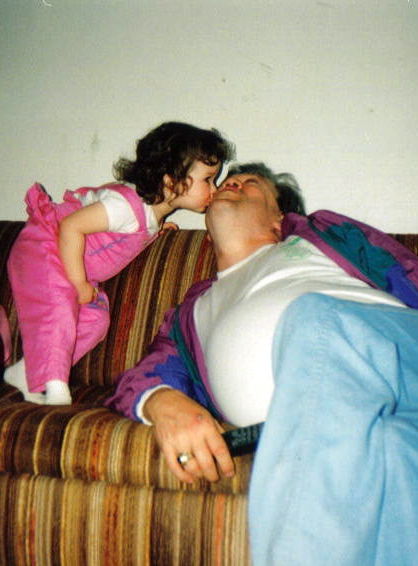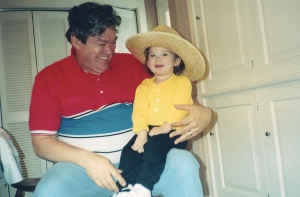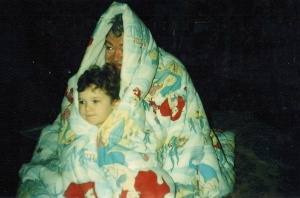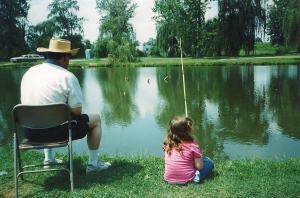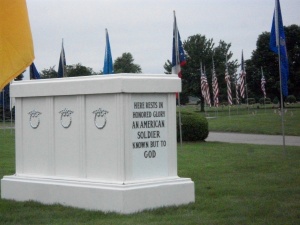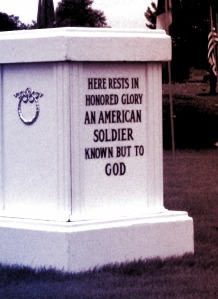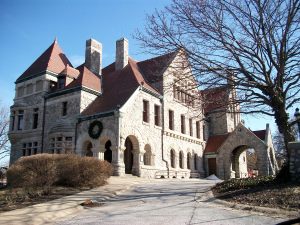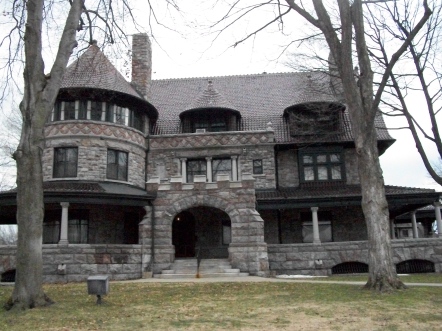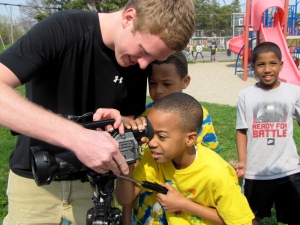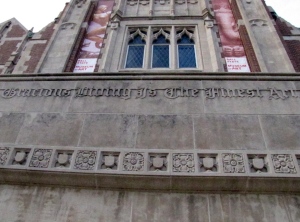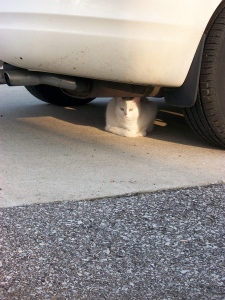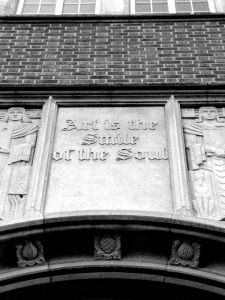I wrote this back in college as part of a nonfiction class. I’m posting it here so I can link to it for a class I’m teaching.
In the days leading up to March 21, 2008, things weren’t looking too bad for Garth Rector. He and his wife were in the process of reconciling a separation and his family had been planning for more than a year to take a trip out to California to see his sister, Marty, retire from the military. His teenage daughter, April, his wife and other sister, both named Angie, were already there. The plan was for him to fly down to Atlanta to meet his parents, who were flying up from Florida, and then fly with them out west. That day after work, he arrived home around quarter to three in the afternoon, just like he did every day. Except this time, someone unexpected and unpleasant was waiting for him.
Garth’s sister, Marty, was the one who received the call telling her that her brother had been murdered and was unfortunate enough to be the one to bear this news to the rest of her family, including her parents, who were still in Florida, waiting to leave to meet their son. The Rector families caught the first flights back to Muncie.
“That was just the most horrible time of my life,” said Angie. “To be so far away.”
I’m talking to her on the phone during a preliminary interview for a preview of Garth Walk I’m writing for the Ball State Daily News. Her voice is shaking and I feel awful for asking her to talk about this event in her life. That’s one of the things I hate about this profession – making people rehash stuff like this. Does the public really need to know this kind of thing? Do I have to open those old wounds that, while are far from being healed, are doing their best to recover? I feel like the journalists you see on cop shows, poking their noses and notepads into everyone else’s pain to get the best quotes for tomorrow’s newspaper.
It’s a Wednesday, late in the morning, and I’m sitting in the newsroom, plugging one ear and holding my phone up with my right shoulder, scribbling frantically in my notebook in a desperate attempt to get her quotes right and listen to what she is saying. Other people in the newsroom are talking, sometimes loudly (sportswriters), making it difficult to concentrate. I would have loved to yell at everyone, “Shut up, can’t you see I’m on the phone?” but I’m just a rookie here and everyone else has been on staff for at least a year, if not longer. Until I gain some kind of seniority, I don’t get to make demands.
Angie continues, telling me she has been organizing events like the Garth Memorial Walk during this and the last two Octobers to hold on to her brother’s memory and raise awareness for families like hers who must now live without someone because of someone else’s hatred. She shares two reasons for her dedication – she wants to know who killed her brother and she feels that someone sometime will come forward either at the events or because of them. She wants people to know they can be protected if they speak up and even have the opportunity to win the $10,000 reward she raised during Garth Fest, a concert held five months after her brother’s death. Her other reason is for her family, her parents in particular. She wants her parents to be able to talk to others who have suffered as they have.
“I have this for my family,” she says, “I have this for my mom . . . It’s important to her to know she’s not the only one who feels what she feels . . . I have to do this. If I could change places with Garth, for my parents, I’d do it. I know they would miss me, but he was their only son. I would swap places with him in a minute if it would ease some pain in any way.”
The night before the walk, I check the weather for the next day on my phone. Cold and rainy. I go to bed desperately hoping the weatherman is wrong, as I will be spending most of my day outside. No such luck. At seven the next morning, I awake to dark gray skies and head over to the Farmer’s Market to take pictures for a photography assignment. As the morning wears on, it gets colder and begins to drizzle, and my fingers grow numb from holding my hands out to take the pictures. By the time noon rolls around, there is a steady rain and it’s cold even inside and I am hoping that, while the event is important and needs to take place, the walk might be bumped to the next weekend. While thawing between the Farmer’s Market and the Walk, I text Angie, who confirms the time and location. It’s still being held that day at the fieldhouse at Muncie Central High School. Rain or shine.
And so we gather almost an hour later, a single journalist and her photographer, three speakers, a lead investigator, the Rector family and around one hundred others, underneath a pavilion outside the fieldhouse at one in the downcast afternoon. There are nowhere near the people who had shown interest in the walk in the weeks previously, but Angie simply shrugs and attributes it to the weather.
Looking around, it occurs to me that the weather doesn’t seem as appropriate as I thought it would. The people standing around me are laughing and chatting animatedly, garbed in Garth Walk t-shirts or shirts they made themselves featuring loved ones lost. True, there are some tears, but all in all, these people seem to be happy, or at least not despondent. I can’t tell if they were just coping remarkably well or if they’re hiding their feelings, determined to make this a good experience when they still felt like breaking down. It surprises me, but makes things less awkward. I don’t know if they were all members of an organized support group, but they all seem to know each other, calling each other by name and hugging like family. This of course, makes up for the lack of awkwardness I felt by the lack of tears.
Members and close friends of the Rector family are handing out free t-shirts and announcing what seems like hundreds of times that people present should sign the guestbook. Some others set up speakers and other audio equipment. Two men set up a canvas hanging of the photo I had seen in old newspaper articles from the Muncie Star Press and the Indy Star. The man on the canvas banner is a handsome guy with salt and pepper hair and an inviting face, scarred from a car accident his sister would tell me about later. Angie says she had been concerned Garth might worry about those scars, but he never did. He was alive and called his wife, who was also badly injured in the accident, his angel. It changed their relationship, she said, even though they still had some problems. From what I can see of him, he appears to have been a well-built guy, stocky but not chunky. Angie tells me he was very athletic and involved with the Muncie Central wrestling team.
Angie says she wants everybody to know her brother was not perfect, but he was a good man who thrived on helping people. He would take young people under his wing, like Kelii and Leimana Kahlekomo, a set of twins who I can see ten feet away talking to people and passing out t-shirts. Their father worked with Garth at Ball State. “They had attitudes. They just needed a little bit of guidance and he took them in and he did that and they’re wonderful young men.” She tells me Garth befriended lots of people at his church who “just needed a little bit of extra. That’s just what he did and that’s what he wanted to do.”
Garth was the kind of guy you’d want as your next-door neighbor. And now he’s gone. Stolen from the world by a gunman (or woman) with a score to settle. Or maybe there was no score. Maybe they just didn’t like him. Maybe he just represented something they hated or would never have. Until the shooter is caught, I suppose the world and his family will never know. I never even met the man – he was killed before I came to Muncie – and even I mourn him.
I am leaning with my back against one of the wooden posts of the pavilion, doing my best to stay out of the way while remaining close enough to the action to keep myself and my equipment from being rained on. I’m supposed to be observing and recording, not getting involved, though I am tempted to help hand out t-shirts or something. I feel terrible just waiting, not doing anything. I’m not used to being so still when I’m surrounded by such a flurry of activity.
At one o’clock, Angie introduces her family and the first two speakers, Marwin Strong, a youth minister and Delaware County Building Commissioner, and Rev. Rory Bond, a chaplain with the Delaware County Sheriff’s department. I know him better as Pastor Rory, an assistant pastor at the church I go to in Muncie. He had brought his fourth grade son, Jared, who hangs out with me as I wait for the event to start. He keeps pestering me to talk in my Smeagol voice and to ask one of the organizers if he could have a doughnut from the box someone had brought. I tell him to ask the guy holding them, passing them out to some of the other kids, but he is too shy to ask himself, and I finally give in.
As a youth minister in some of the rougher areas of town, Marwin is no stranger to violent crime. He tells a story of a young man, killed by a stray bullet while trying to avoid a fight on his way home one evening. The boy he’s talking about sounds like someone with such potential. A basketball player, with decent grades and a cheerful attitude, just trying to get home after dark without getting into trouble. I haven’t researched the situation and I don’t know the family, but I am pretty good at visualization. I imagine a mother coming to the door to see two police officers, maybe a chaplain, too, and breaking into tears, falling to the floor when they tell her that her son is dead, shot just trying to come home. I imagine a younger brother or sister, standing immobile in the living room, tears rolling down his or her cheeks as they see Mom fall to the ground in grief and horror at the news. Maybe the sibling was numb, not tearful. How would that change things? Would it change anything at all?
It strikes me then that so often, it is this kind of person who is lost to violent crime. The people so innocent, they don’t necessarily think to watch their backs are the ones to end up with targets between their shoulder blades. It’s hard, at least for me, to feel pity for gang members who die at the hands of another gang, but this boy, only about fifteen or sixteen when he was killed, had done nothing to warrant it. I look over at Jared, who is standing next to his dad now, licking the last of the doughnut glaze from his fingers. He is younger than the boy Marwin is talking about, certainly, but I know kids like him – whose only crime would be to be in the wrong place at the wrong time – are suffering and dying because someone else wants to play God, choosing who will live and who will not.
Pastor Rory gets up and speaks next, talking about the first funeral recorded in Scripture. It wasn’t sickness or death of old age – it was murder. Cain killed Abel over a petty disagreement with God after his brother offered the right sacrifice and God didn’t accept his own. God then vowed vengeance on Cain for his innocent brother’s death, sentencing him to wander the world with a visible mark not only protecting him from human retribution, but also marking him as a murderer for life. He talks about how God’s promise to avenge the innocent in His own time extends to the murders of today. Garth’s murderer and the murderers of the others being remembered by those present will be found out one day and will pay for their crimes. I can’t tell if his words give anyone comfort there. Sure, some, if not all, of these people want vengeance, but I’m sure they would much rather have their fathers, mothers, sons, daughters, and friends with them. However, I hope that the promise of justice is something they can latch onto, regardless of their individual religious beliefs.
I look around as he’s talking. There are tears flowing from many faces, representing stories that have yet to be told, if they ever will be. Some people, I’ve been told, are walking in memory of someone who died peacefully. I don’t know how I can say someone died of cancer peacefully or they died in a car accident peacefully. Cancer attacks like a monster and the crash of metal on metal is far from a gentle way to go. Perhaps a better description would be “not from violence”. Even these have a story. People living everyday lives to have them cut short, leaving their loved ones behind. Friends, family members, hey, for all I know, there are people out there mourning these fallen who had never even met them or had the chance to let them know they cared.
It is often said that we should tell people we care about them whenever we can, because we don’t know when the last time we’ll see them will be. How many chances have I missed? I have been fortunate enough not to have lost very many people in my life, but how am I to know what the future will hold? How many of these people blissfully gave up their last chance to tell someone they loved them, never thinking that the next time they would see them would be in a casket at a funeral home?
The walkers start off on their journey from the fieldhouse to Minnetrista, the cluster of mansions once owned by the Ball family, and back, leaving behind a few people who would not be able to stand the walk and weather conditions. Among them is a blonde woman in a pink sweater and jeans. She is wearing a round button on her shirt with the picture of a brown-haired girl smiling out at me. The woman is Susan Teegarden. Her daughter, Heather, was murdered in her downtown Muncie apartment eleven years ago. Heather was only nineteen at the time. In her speech after the walk, Susan’s other daughter, Savannah Teegarden, Miss Ball State 2010, tells those assembled her sister’s story.
On February 2, 1999, Heather’s apartment’s furnace had broken and, in an effort to escape the oppressive heat of her apartment, she had opened her back door. A man named Louis Verner entered the apartment, raped, strangled, and murdered her.
“It kills me today to even think about it. I’m twenty-one and I remember being nine years old when it happened and I remember thinking ‘Heather lived a really long life.’ Nineteen seemed so much older than what I was at that time and I really didn’t think anything of it, and now being twenty-one, I’m, like, ‘Wow, I haven’t even started my life.’ I haven’t thought about the man I’m going to marry, I haven’t thought about my kids, I haven’t thought about any of that, and that’s something that Heather will never get the chance to do.” Savannah says, her voice shaking at the end.
I can’t imagine what it would be like to lose someone this way and then come out and talk about it, even at venues like this. I assume her near-flawless delivery of these facts is due in large part to her having gone over it time after time to counselors, friends, and others that it’s easier to get the words out now. However, I can’t help but think about how it would feel for me to be standing where she is, an umbrella over her head, talking to about a hundred people about the gruesome murder of her sister. I know my throat would have closed up for sure. I would have broken down. This girl is so much stronger than me.
The Teegardens had to wait nearly four years before Verner was found. Susan has a theory about why her family was allowed to wait for so long.
“I think that a lot of times God, in our case, held off finding him because we needed some kind of healing inside that we had to do before we could deal with facing him.”
Verner is currently serving life without parole.
One part of Garth Walk I have been looking forward to most is the balloon launch. I have seen these before and they stand as a truly touching and beautiful experience, especially for those grieving for loved ones. There is a stack of cards on one of the picnic tables in the pavilion that has been blowing about for much of the afternoon, sitting next to boxes of green ink pens that don’t write very well after being out in the cold for hours. As they arrive back at the pavilion, people take the cards, writing messages to their loved ones departed. On the back of the cards a label sticker makes its plea – if anyone has any information about the Rector murder, please call Kurt Walthaur at the Delaware County Sheriff’s Department. While volunteers bring in the deep purple balloons to tie the messages to, the man controlling the sound system plays the song “I Can Only Imagine” by Christian band MercyMe, a song Angie says she chose to represent her brother.
“I can only imagine what it will be like
When I walk by Your side
I can only imagine what my eyes will see
When Your face is before me
I can only imagine
I can only imagine”
I don’t know how I can tell with the rain coming down – the gentle shaking of the shoulders, the wiping of eyes, the sniffles? – but this is when tears really start flowing, both for the people in attendance and for myself. The emotion is almost palpable, weighing on the area like a wet quilt, and it breaks my heart. There is so much pain here and, for some, it’s the only place they can let it show, among so many others who know exactly what they’re going through. Most of us have lost someone to something – old age, accidents, illnesses – but watching these people cements my belief that there is a special bond between those who have lost someone to murder that those of us who are lucky enough not to have experienced that tragedy will never have or be able to understand. People don’t need to say anything – everyone knows what each other is thinking. It is a world and an experience I am shut out from, despite my presence.
“Surrounded by Your glory, what will my heart feel?
Will I dance for You, Jesus, or in awe of You be still?
Will I stand in Your presence or to my knees will I fall?
Will I sing hallelujah? Will I be able to speak at all?
I can only imagine
I can only imagine ”
I imagine the scene in their minds of balloons and the messages reaching loved ones in heaven, drifting right up through the clouds to the pearly gates, where their loved ones, aware of the incoming mail, are waiting to receive the words of those they left behind. I imagine there’s a solace there, feeling that their words are reaching them, all the things they forgot or didn’t feel the need to say can still able to be said, via balloon mail. Personally, I like to think the solace is accompanied by the feeling of the departed responding, giving comfort, however distant.
During the song and launch, very little is spoken aside from the three-second countdown. Tears are shed, but people are too lost in their own thoughts, or in the message of the song, to speak much. Mostly, they just watch the majority of the balloons drift upward out of sight. Some balloons, suffering from helium deprivation, don’t make it skyward and catch on the fence next to the pavilion or drift into the parking lot next to the fieldhouse and go down there. I like to think the messages drift up just the same.
I declined a card to write a message on and on my way home that afternoon, I realize that might have been a mistake. It seemed like such a catharsis for the people around me. My grandfather died nine years ago and, as much as I hate to admit it, I’m still not as “over it” as people think I am. I think about what I would have written, what I would have wanted him to know if he were here. He’s missed so much of my life and had so many high hopes for it that it seems unfair for him not to be able to know what’s going on now. Maybe one day, something like this will come along again and I’ll have the chance to remedy that little mistake.
I have to admit, I feel bad thinking this way. These people suffer, and will continue to suffer, so much more than I do, and the thing I drive home thinking about is still myself. Perhaps the event lent itself to more introspection by those who were there or maybe I’m just feeling guilty about not bringing myself to fill out a card because I thought my grief wasn’t worth it. I don’t know why this is. Is anyone’s grief more important or meaningful or appropriate than someone else’s? My grief is mine and their grief is theirs and it hurts just the same, doesn’t it?
We all feel grief differently. We all cope with grief in different ways. Some of us grieve publicly, holding events to facilitate the grieving and give others a place to remember and grieve, too, allowing others to grieve with us. I admire these people, because the strength to let my emotions show where others can see them is something that has always eluded me.
Others speak to therapists, trying to work their way through feelings that were, perhaps, never really meant to be dissected. Sometimes, it’s best just to let yourself feel it, rather than to analyze it.
Others, like me, grieve alone, behind closed doors, ashamed or unwilling to let people see us cry. How can it still hurt so much all these years later? Shouldn’t we be able to just shrug it off and get on with our lives? The answer to that question, of course, is no. I don’t pretend to have all the answers, but do know that events causing this much hurt can’t be simply shrugged off after a set period of mourning. I’ve asked myself over and over again and have come to the realization that pain that doesn’t abate is there for a reason and there’s something else to be learned from it – something else to be experienced. Maybe it opens up a way for us to feel more empathically the hurt of others, even if we cannot feel their pain the way they do. We can say, however cliché this may be, that we’ve been there, or at least, close by, giving whatever comfort those words hold to another who needs it.
I’ll never know what it’s like for the Rector family. I’ll never know what it’s like for the other families that gathered there that day. All I know is, while I watched those purple balloons drift silently into the air, that hearts all around me were lifting with them. Through the pain and the struggles that come by muddling through the crushing feeling of loss, they rose for however brief a time to linger with the ones they were remembering. For that moment, pain was lessened as that contact was made. I don’t need a murdered loved one or a message tied to a balloon to understand that.
“I can only imagine when that day comes
When I find myself standing in the Son
I can only imagine when all I will do
Is forever, forever worship You
I can only imagine
I can only imagine”

